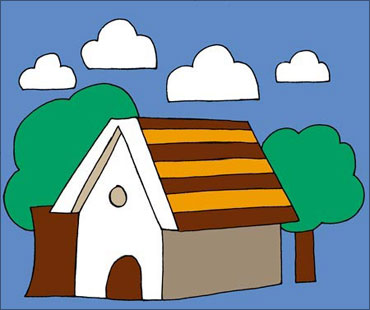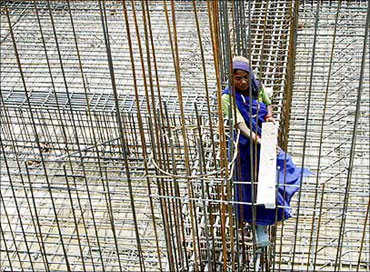
While the worst might be over for the realty sector, rising property prices, possibility of higher home loan rates, debt burden and likely tightening to curb inflationary pressures are likely to be key hurdles.
The March quarter and the 2009-10 result of India's largest listed realty company, DLF, as well as the sales numbers of Unitech, the number two, indicate a revival of sorts.
Though there has been an improvement due to an increase in demand in the residential segment, a sharp increase in prices across the country could stymie the recovery.
A poor response on listing for Nitesh Estates' IPO and the recently unsuccessful qualified institutional placements from realty companies also indicates lack of investor appetite.
. . .

Demand robust, inventory an issue
Analysts estimate residential sales volumes in 2009-10 to be in the region of 250 million sq ft. This is higher over 2008-09 numbers by two-thirds and just shy of 2007-08 numbers (when sales had peaked) by a fifth.
This is also reflected in the sales in 2009-10 reported by India's largest listed entities in this space, DLF and Unitech. While DLF managed to sell 85 per cent of the 13.23 mn sq ft launched in 2009-10, Unitech had sales of 16.6 mn sq ft and launched projects totalling 26 mn sq ft.
The year-ago comparison, despite the low base, offers a stark contrast to the difficult days in the last two quarters of 2008-09. DLF sold 6.76 mn sq ft in the December and March quarters of 2009-10, while the year-ago figure for the two quarters was 1.4 mn sq ft. Unitech reported similar numbers.
A Credit Suisse report says monthly home purchases in key metros have risen by two and a half times from the bottom (December 2008) and new launches have not kept pace with purchases, especially in the March quarter of this year.
Inventory levels, too, are down about 28 per cent from the peak recorded in July 2007. Inventory levels had come down last year as developers dropped prices and launched affordable homes. Aided by an improving economy and rising affordability, it helped absorb the supply.
However, developers are still sitting on inventory of Rs 45,000 crore (Rs 450 billion) countrywide, estimates a Kim Eng Research report on the sector. Since April 2009, it says, developers have pre-sold 38 per cent of the 280 mn sq ft launched thus far.
Credit Suisse believes new launches are down as developers need to offload the projects launched last year. But, given the difficulty in access to fresh capital, it also means they will need to convert their unsold inventory before they can launch fresh projects.
. . .

Price: Too high, too fast
The worrying factor for the sector, however, is prices. These have shot up to 20 per cent in key locations over the last year and are nearing the peak levels recorded in 2008.
While this would be considered normal since demand has picked up, debt overhang, unsold inventory and lacklustre response from equity investors could mean realty companies will be forced to cut prices to offload inventory and improve cash flows.
While listed developers managed to raise about Rs 11,000 crore (Rs 110 billion) from institutional placements to fund operational expenses in 2009, they still need Rs 16,000 crore (Rs 160 billion) to fund their projects over the next two years, says Anubhav Gupta of Kim Eng.
Given that some realty companies such as Omaxe and Purvankara Projects could not raise fresh capital due to lacklustre response, and Parsvnath Developers had to cut its issue size, developers may have to raise more debt or resort to price cuts and take a hit on margins. If this happens, the aggregate debt to equity ratios, which had improved considerably last year and is at 0.8 times currently, will increase to about 1.1 in 2011-12, believes Gupta.
. . .

Valuations
The Street's concern on the impact of higher interest rates, inflation and debt concerns of the sector, as well as regulatory changes which might make it difficult for them to raise loans, is reflecting on stock prices, with the sector underperforming the broader markets.
While the Sensex is up 4 per cent since the start of 2009, the BSE Realty index has dipped six per cent over the same period. Weak market conditions in the recent past has meant that issues such as Nitesh Estates are struggling to stay at the IPO price.
The Street's also concerned that the commercial segment is languishing and not expected to recover before the second half of this financial year.
Among realty stocks, analysts are betting on Unitech, Indiabulls Real Estate and Housing Development & Infrastructure on the counts of robust sales, strong cash flows and higher earnings growth.